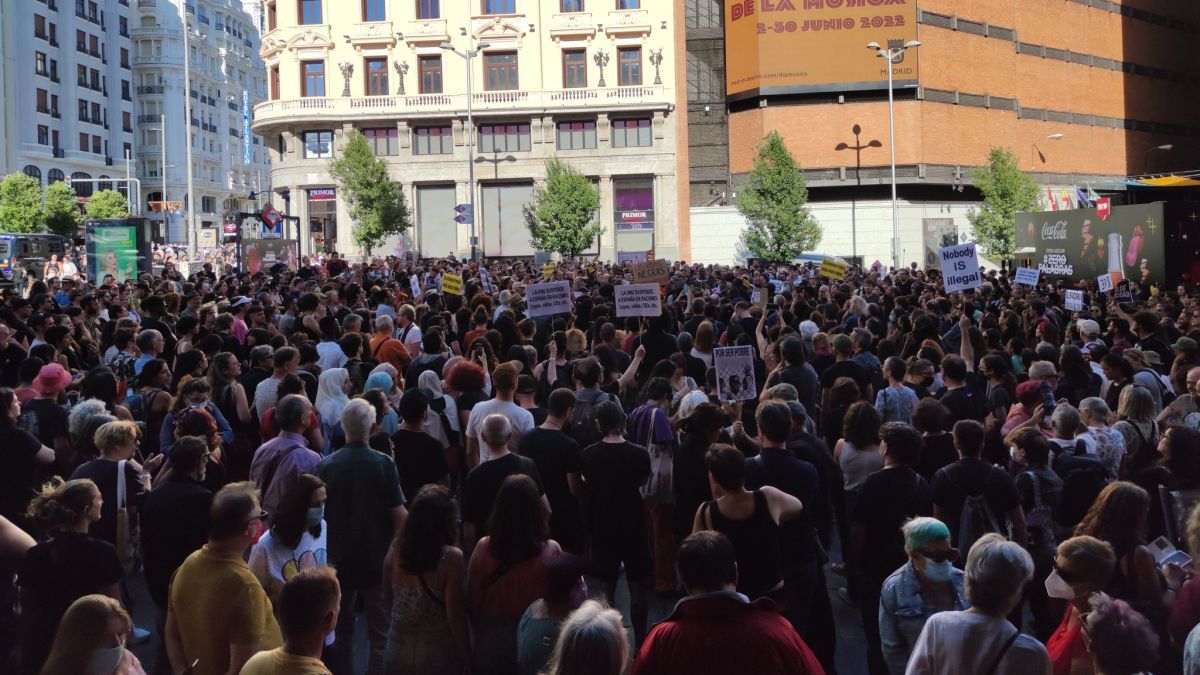One of the many rallies took place in the Idrissa Diallo square in Barcelona, called by different non-governmental organizations that defend human rights, with the aim of raising their voices to account for what they consider “not deaths, but murders” by the occurred at the border crossings of Ceuta and Melilla.
spain protest melilla.mp4
“They are not dead, they are murders”, one of the slogans of the protests against the crimes in Melilla.
According to the Spanish media outlet La Vanguardia, during the protests in the Catalan capital, slogans were raised with slogans such as “Papers for all”, “Punishment of the murderers of Immigrants”, “Black lives matter”, “No person is illegal”, “Morocco and Spain: murderous gendarmes of fortress Europe” and “Regularization now”.
The place chosen for the protest is not accidental. The square is named after an immigrant from Guinea who in 2012 was arrested after jumping the fence in Melilla and entering Spain. His story is remembered because after being arrested, he had to be taken to a hospital where he died of respiratory failure.
In Madrid, the Spanish capital, the protesters also denounced the “massacre” that occurred on the border between Spain and Morocco and demanded that the Pedro Sánchez government “respect” the human rights of migrants, under slogans such as “All lives matter ” and “No human being is illegal.”
What happened in Melilla
“That was the war. We had stones to fight against the Moroccan soldiers,” testifies a 20-year-old Sudanese, with whom the international agency AFP was able to speak on Saturday in a detention center in Melilla.
Another migrant, detained in the same center, says that he scaled the fence that separates the Moroccan city of Nador from the Spanish enclave before a security agent beat his hands.
women personifying the mask of Melilla.jpg
A group of people staged one of the images that circulated in the media about the Melilla massacre. Some NGOs point out that the death toll stands at 45 people.
“I fell unconscious on the Spanish side where I was beaten by the forces of order,” he explains.
These two young men were part of nearly 2,000 migrants from sub-Saharan Africa who tried to enter on Friday morning in the Spanish autonomous city of Melilla, located in Moroccan territory.
At least 23 migrants were killed and 140 policemen were injured.according to local Moroccan authorities.
It is the deadliest toll ever recorded in the numerous attempts by sub-Saharan migrants to enter Melilla and the neighboring Spanish enclave of Ceuta, which constitute the EU’s only land borders with the African continent.
The unprecedented violence of the assault marks a turning point, according to migration experts.
The deterioration in living conditions
Located in the extreme northwest of Africa, Morocco is a transit country for many migrants seeking to reach Europe, from its Atlantic or Mediterranean coasts.
“The Moroccan authorities treated the migrants very harshly. They besieged their camps. There is no doubt that this pressure generated the unprecedented violence that we have witnessed”Naji assures.
Prior to Friday’s drama, Spanish media had reported sporadic clashes between migrants and Moroccan law enforcement.
For Oussmane Ba, president of the group of sub-Saharan communities in Morocco, “The difficult conditions in which these migrants live psychologically condition them to violence.”
Most of the new migrants arriving in Morocco come from Sudan, particularly Darfur, where a new outbreak of violence recently caused hundreds of deaths and 50,000 displaced people.
Despite attempts to drive them away from the Nador region, they remain determined to re-enter the EU at the risk of their lives.
“We are talking about people waiting here for two to three years. Morocco cannot completely close its borders to play the role of Europe’s gendarme, this policy will lead to more violence,” Naji warns.
Moroccan police announced that on Sunday morning a plan to storm the metal fence between the province of Tetouan (northern Morocco) and the enclave of Ceuta had failed.
According to the General Directorate of National Security (DGSN), 59 candidates for clandestine immigration were detained.
Source: Ambito
David William is a talented author who has made a name for himself in the world of writing. He is a professional author who writes on a wide range of topics, from general interest to opinion news. David is currently working as a writer at 24 hours worlds where he brings his unique perspective and in-depth research to his articles, making them both informative and engaging.




